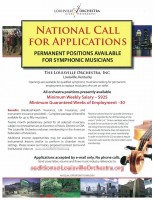At the end of last week, the Louisville Orchestra (LO) followed through on its announcement to hire permanent replacement musicians by sending out a “National Call For Applications” Flyer to a variety of academic institutions. The one page flyer contains basic compensation information and that the current openings are to “replace musicians who are on strike.”

There is no mention of application deadlines, when employment will begin, how candidates will be selected, or whether an audition process is planned. Additionally, the flyer requests that interested applicants submit a “cover letter, resume, and three music-industry references.” The request for a cover letter, along with some other peculiarities in language, made it seem as though the flyer might have been a hoax.
But according to LO Media Relations Manager, Heather O’Mara, the flyer is legitimate and the organization has been distributing it. When asked which organizations and/or individuals were sent a copy of this flyer and whether or not the organization has received applications or signed notices from existing musicians about their willingness to return under unconditional terms, Ms. O’Mara declined to comment and referred the questions to Robert Birman, LO CEO.
At the time this article was published, Mr. Birman has yet to reply.
Now You See Them, Now You Don’t
Likewise, the LO website does not contain any information about the “National Call For Applications” nor does it provide a copy of the flyer or any indication of the openings on its “employment” page. In fact, the latter contains a message that reads ” There are no employment positions available at this time. Please check back later.”
Similarly, the musician roster page which used to be located at http://www.louisvilleorchestra.org/?page_id=24 has been removed from the website, however, Google has the page as it was on 10/19/2011 cached here. And although the direct links are no longer available, the musician bios which used to be linked from the roster page, such as this one for concertmaster Michael Davis, are still available.
Response from within the musician community to these actions along with last week’s ultimatum to LO musicians on returning to work via unconditional terms have been stern. The Seattle Symphony and Opera Players’ Organization (SSOPO) urged members not to accept work at the Louisville Orchestra and in a similar move, the International Conference of Symphony and Opera Musicians (ICSOM), of which the LO musicians are members, issued a memo to members from chairman Bruce Ridge with the subject “URGENT- DO NOT ACCEPT WORK FROM THE LOUISVILLE ORCHESTRA, INC.”
The LO musicians issued a press statement on 10/31/2011 announcing that all but one of the musicians have refused the unconditional terms for employment issued last week by the LO. Moreover, they have reportedly notified management in writing that they are not on strike and are not withholding their services.
Nonetheless, the LO’s deadline of 5:00pm CT, October 31, 2011 for musicians to acknowledge their willingness to unconditionally return to work has now passed and if musician claims that all but one of their members have refused are accurate, then the LO must presumably intend to replace the entire orchestra (save the one unknown musician position).
You Don’t Want To Miss These
There are two recent articles worth your time that touch on all of this. The first is from the 10/31/2011 edition of the Louisville Courier-Journal reports in an article by Elizabeth Kramer that the musicians have “filed a complaint with the National Labor Relations Board, claiming that orchestra officials have refused to bargain in good faith during their ongoing contract dispute.”
Birman calls the charges baseless and although he acknowledged receiving some of the letters referenced in the musicians’ press statement, he deflected questions about the letter’s content by casting aspersions on authenticity. He went so far as to imply that the musicians’ negotiation committee may have forged some of the signatures.
“[Birman] did email The Courier-Journal just after 2 p.m. Monday to say that he had received the musicians’ signed form letters. But he expressed concerns about some of those.
“It is curious to see that some player names are spelled wrong AND the signatures carry the same misspellings,” he wrote. “It is clear that the (musicians’ negotiating committee) signed some of these letters on behalf of colleagues who have left Louisville.”
The second article is from Gabe Bullard in the 10/31/2011 edition of WFPL News which includes some quotes about the current dispute from LO CEO Robert Birman along with additional information about the unfair labor charge from musician spokesperson Kim Tichenor.
[sws_yellow_box box_size=”640″] Postscript: On an editorial note; yes, I am aware that in the WFPL article Mr. Birman offered what might be construed as less than complementary remarks about me being a blogger. I do not intend to reply publicly to what appears to be a rather slapdash offering; however, if you’re a Facebook friend, you can read my personal reply in the form of a status update from yesterday evening. [/box]



Nice smackdown on Birman at your facebook page, Drew.
I had a thought yesterday after going to the WFPL link from your post–it had that one sentence blurb about the Naples Phil being a nonunion orchestra which I thought was strange and just a bit out of place in the piece. But I guess the connection is that Jorge Mester is the (or was) the conductor for that group, but apparently they haven’t renewed his contract.
I guess what I find intriguing is that as well as being a nonunion orchestra, the Naples Phil has 49 full time musicians.
I know also that Jorge Mester took over the conductor reins of the LO once Robert Whitney stepped down, but this was also during a time when the LO did go to a 50 member group.
What I’m wondering is, how often are conductors silent during labor disputes? And how much influence in certain decisions do they actually have? I’m not implying some insidious masterminded plan by Maestro Mester here, but I do find it interesting that he’s worked with 50 member orchestras (one of which was an earlier incarnation of the LO); and that one of those orchestras is a nonunion orchestra; and he is still listed as principle conductor of the LO which is presumably now attempting to be a nonunion orchestra.
What do you make of this?
The impending decisions from the entire conducting staff (Mester, Bernhardt, and Weinberger) are going to play an integral role in how things unfold in upcoming weeks. This is purely speculation on my part but I would be surprised if they weren’t holding out on any public announcements regarding their status with the orchestra in hopes of both sides reaching a deal. But the latest round of events certainly places increased pressure on them to make a decision and if they remain too long, it could have undesired consequences. One thing I have yet to see if any sort of official statement from the musicians (or any organization musician group such as ICSOM) espousing any specific actions from any of the conductors. Has anyone else noticed something like that?
Regarding your postscript: Drew, I would consider being insulted by Robert Birman to be an accomplishment which should be added to your already impressive bio. To be dissed by Robert Birman is a badge of honor! BTW, you are valued by countless music professionals (including me) as one of the sanest, smartest, most savvy, most innovative, and most consistent voices in our industry.
Thank you for the kind words George, that means a great deal coming from someone like you (and for the folks who may be unaware, George is the mastermind behind the wildly popular and award winning Bugs Bunny at the Symphony and Bugs Bunny on Broadway shows).
Drew,
What say you about the Kentucky Opera’s predicament, as explained in this press release: http://kyopera.org/documents/press/AFM-unfair-Listing-is-unfair.pdf?
I was struck by this phrase “Recently, KO offered AFM Local 11-637 to contract musicians for THE MARRIAGE OF FIGARO under the union’s own published fee per-service rate for opera and ballet…The offer made by KO was rejected by the union and its musicians.”
The LO side of the story is getting lots of press, but not much about the opera company.
Thanks!
My apologies for the delayed reply but the LO and the KO are increasingly intertwined in all of this. Even though both organizations share administrative resources, they both have independent boards of directors and the KO’s board could have distanced themselves from the situation but they made the decision to align their labor and contractual positions along with the LO’s positions. As a result, it shouldn’t come as much of a surprise to anyone that the musicians and the their union would take a similar approach toward the KO as they have with the LO. To those ends, it is still possible for the KO board to adopt a new strategy and approach and if so, they may discover that there’s more flexibility than previously believed.
Indiana University received the flyer and is responding appropriately – both the orchestra manager and conductor spoke at rehearsal this afternoon and in no uncertain terms implored students not to apply for positions with the Louisville Orchestra. Possible career ramifications of applying were emphasized. I sincerely hope students in schools across the country will be hearing the same thing this week.
Is this something you heard second-hand Michael or did you witness it personally?
I witnessed it personally.
Thanks for clarifying that Michael, I’d be very interested to hear other first hand accounts at other conservatories and schools of music.
Drew, it needs to be pointed out the Naples Philharmonic is a non-union orchestra with a CBA contract. Their contract reads similar to most other union orchestra CBA’s. For this orchestra to be singled out by either Mr. Birman or Mr. Bullard (whoever actually said that “sentence” in the article) shows total ignorance of that orchestra’s deal.
If Birman said it, you consider the source. If Ballard put this in, why drag the Naples Phil into this?!?!?
Also, to the best of my knowledge, Naples never kicked out its own orchestra, and I don’t believe it ever was a union group.
Drew,
I brought this to the attention of the orchestra administrator at Indiana University as soon as I saw it posted on your site. It has been noted to the applied faculty as well if any of their students approach them with an interest in this flyer from the Louisville orchestra.
Also, the AFM did send out an email to the union musicians of ICSOM, ROPA, and OCSM from Bruce Ridge urging them not to accept work from the Louisville Orchestra.
Best!
Well done, Josh.